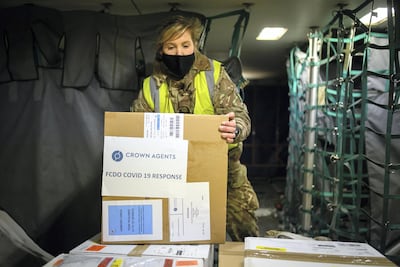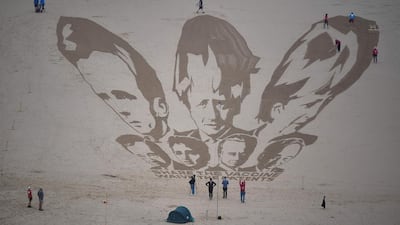The UK will donate 100 million surplus Covid-19 vaccine doses to the world.
Prime Minister Boris Johnson announced the pledge ahead of the G7 summit in Cornwall, which begins on Friday.
The doses will be given out within the next year.
Last week, Mr Johnson urged the world's largest economies to pledge to vaccinate the global population against Covid-19 by the end of 2022.
He said it would be "the single greatest feat in medical history” if the goal was achieved next year.
At the summit, the first meeting of G7 leaders since the start of the pandemic, he will ask for “concrete commitments” to inoculate the world by the end of 2022.
G7 leaders are poised to pledge one billion vaccines to the world in an effort to overcome the coronavirus pandemic by the end of 2022.
The World Health Organisation estimates that 11 billion doses will be needed to fully inoculate the global population.
UK Vaccines Minister Nadhim Zahawi agreed that even with the G7 donation pledges "fundamentally, there's a shortage" to vaccinate everyone. He urged pharmaceutical companies to scale up manufacturing.
He said the UK's vaccination programme will not be affected by the donation of 100 million doses.
Zoe Abrams, executive director at the British Red Cross, said the promise on vaccines was heartening but that she still had concerns.
"While every commitment must be welcomed, more needs to be done, and fast," she said.
Lis Wallace, head of UK advocacy at anti-poverty campaigners One, said the global distribution was "not happening anywhere near fast enough".
G7 leaders are due to set out a plan for sharing doses, and financing and expanding vaccine manufacturing to achieve that goal.
World leaders are under pressure to redress an imbalance in global vaccine supplies condemned by human rights groups and the WHO.
On Wednesday it was reported that Washington was ordering 500 million of Pfizer-BioNTech's Covid-19 vaccines to share with other countries.
The move is a major step towards President Joe Biden's plans for a bigger US role in the fight against the pandemic, in which more than 3.7 million people have died worldwide.
The UK will donate five million doses by the end of September, beginning in the coming weeks, primarily for use in the world’s poorest countries.
Mr Johnson committed to donating another 95 million doses within the next year, including 25 million more by the end of 2021. About 800,000 doses will go to Covax and the remainder will be shared with countries in need.
Downing Street said it would meet an immediate demand for vaccines for the countries worst affected by coronavirus without delaying completion of the UK’s initial domestic vaccination programme.
Vaccinating more people around the world would help reduce the risk to people in the UK, it said.
Covax has so far provided 81 million doses to 129 of the world’s poorest countries, the vast majority being the Oxford-AstraZeneca vaccine.
“As a result of the success of the UK’s vaccine programme we are now in a position to share some of our surplus doses with those who need them. In doing so we will take a massive step towards beating this pandemic for good," Mr Johnson said.
“At the G7 summit, I hope my fellow leaders will make similar pledges so that together we can vaccinate the world by the end of next year and build back better from coronavirus.”

G7 leaders will also discuss how to expand the supply of vaccines internationally, with Mr Johnson asking the group to encourage pharmaceutical companies to adopt the Oxford-AstraZeneca model of providing vaccines at cost for the duration of the pandemic.
Pfizer, Moderna and Johnson & Johnson have already pledged to share 1.3 billion doses on a non-profit basis with developing countries.
Leaders are expected to discuss additional ways to support countries experiencing acute coronavirus emergencies and put in place mechanisms to prevent future pandemics. This follows commitments made at an online meeting of G7 leaders earlier this year.












